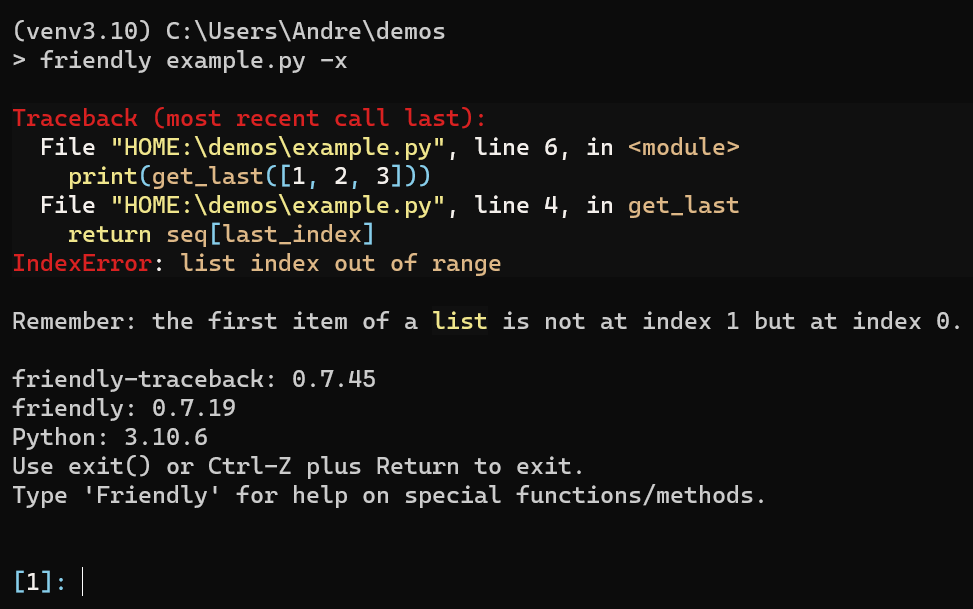Warning
Most of the documentation was written prior to version 0.5 and needs to be updated. This work has now started for version 0.7 and we aim to have it completed before version 0.8 is available.
Interactive mode¶
Python is often run in interactive mode, where a user type statements one by one, with Python interpreting the result. This can be done in a terminal, in a Jupyter notebook, and various other environments.
In this section, I will demonstrate various features of Friendly in interactive mode in a terminal.
The example I will be using is essentially the same as the one shown on the first page of this documentation: I have a file with the following content:
# example.py
def get_last(seq):
last_index = len(seq)
return seq[last_index]
print(get_last([1, 2, 3]))
However, instead of using:
friendly example.py
to run this file, I will add an additional -x flag and have the following:
friendly example.py -x
> friendly example.py -x
Traceback (most recent call last):
File "HOME:\demos\example.py", line 6, in <module>
print(get_last([1, 2, 3]))
File "HOME:\demos\example.py", line 4, in get_last
return seq[last_index]
IndexError: list index out of range
Remember: the first item of a list is not at index 1 but at index 0.
friendly-traceback: 0.7.45
friendly: 0.7.19
Python: 3.10.6
Use exit() or Ctrl-Z plus Return to exit.
Type 'Friendly' for help on special functions/methods.
[1]:
The output above includes a normal Python traceback followed by a reminder
about list indices, and ends with a numbered prompt [1]: awaiting for
user input.
In order to keep the documentation shorter, in the following pages, I will use a slightly modified example, one that raises a warning as well as an exception:
# example2.py
import warnings
def indiana_pi():
warnings.warn("Indiana, February 6, 1897", DeprecationWarning,
stacklevel = 2)
return 3.2
indiana_tau = indiana_pi() * 2
def get_last(seq):
last_index = len(seq)
return seq[last_index]
print(get_last([1, 2, 3]))
Here’s the result:
> friendly example2.py -x
DeprecationWarning: Indiana, February 6, 1897
Traceback (most recent call last):
File "HOME:\demos\example2.py", line 15, in <module>
print(get_last([1, 2, 3]))
File "HOME:\demos\example2.py", line 13, in get_last
return seq[last_index]
IndexError: list index out of range
Remember: the first item of a list is not at index 1 but at index 0.
friendly-traceback: 0.7.45
friendly: 0.7.19
Python: 3.10.6
Use exit() or Ctrl-Z plus Return to exit.
Type 'Friendly' for help on special functions/methods.
[1]:
In terms of the output, the only difference with the first example is that we see a DeprecationWarning printed before the traceback. Unlike exceptions, by default warnings do not interrupt the normal execution of a program.
Using this example, in the next pages, we will see various functions that can be entered at the prompt to give us more information.
